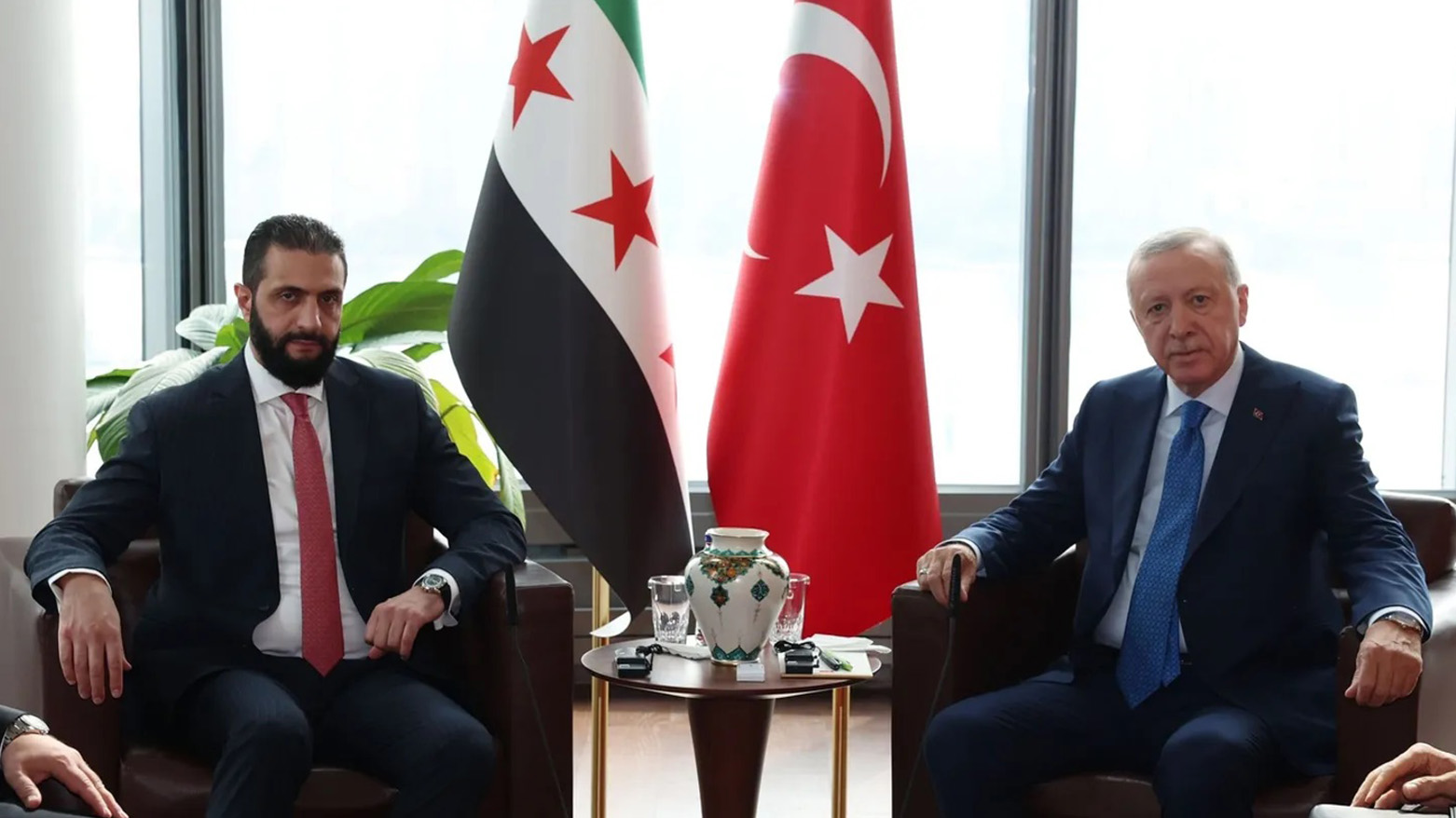Erdogan and Al-Sharaa Weigh Implementation of March 10 Agreement with SDF
Erdogan and al-Sharaa met at the UN to discuss implementing the March 10 Agreement with the SDF, emphasizing Syria's territorial integrity. The Syrian Democratic Council, however, states no Kurds are included in Damascus's official delegation, highlighting a gap in representation.

Erbil (Kurdistan24) – Turkish President Recep Tayyip Erdogan and Syrian transitional President Ahmad al-Sharaa held talks in New York on the sidelines of the 80th United Nations General Assembly, focusing on the implementation of the March 10 Agreement between Damascus and the Syrian Democratic Forces (SDF). Their meeting came at a time when both leaders face scrutiny over Syria’s political transition, Ankara’s regional policies, and the unresolved question of Kurdish representation in international forums.
According to Turkish and Syrian accounts of the meeting, Erdogan urged al-Sharaa to accelerate the removal of “all obstacles” facing Syria’s transition, emphasizing that Türkiye’s vision remains anchored in safeguarding the country’s territorial integrity and sovereignty. He insisted that the SDF must fully abide by the March 10 Agreement, signed earlier this year between al-Sharaa and SDF commander Mazloum Abdi, and reiterated that Ankara’s stance is to support Syria only as a unified and whole state.
The Turkish president’s comments mirrored his earlier address to the UN General Assembly on September 23, where he declared: “We will support with all our means the vision of a one and whole Syria where there is no presence of ISIS or any other form of terrorism and where security is established. As stability takes root in Syria, its beneficiaries will not only be Syrians but all neighboring and regional countries.” Erdogan also used his speech to call for international recognition of Palestine, to criticize Israeli military actions in Gaza, and to urge global backing for Northern Cyprus.
The March 10 Agreement, hailed at the time as a breakthrough between Damascus and the SDF, contains a series of commitments designed to integrate the Kurdish-led forces into the Syrian state while safeguarding political and social inclusivity. Its key provisions include: recognition of equal rights for all Syrians regardless of religion or ethnicity; constitutional guarantees for Kurds as an indigenous community with full citizenship rights; a nationwide ceasefire; integration of all civil and military institutions in northeastern Syria into state authority, including border crossings, airports, and energy facilities; guarantees for the safe return of refugees; and a joint implementation committee tasked with overseeing the process through the end of the year.
The deal also pledged government support in fighting remnants of the Assad regime and ensuring that divisive rhetoric and calls for partition were rejected. For Erdogan, the agreement represents a test of whether the SDF will relinquish its autonomous structures and become part of a centralized Syrian state.
Yet the broader political context reveals stark contradictions. In an exclusive interview with Kurdistan24 during the UN General Assembly, Sinam Mohamad, the Syrian Democratic Council’s (SDC) Representative to the United States, categorically denied any meetings with al-Sharaa or his delegation, stressing that the official Syrian team in New York was “a delegation of one color and one party, with no Kurds among them.” She described the exclusion of Kurds from Syria’s official representation as a glaring continuation of old practices, despite the rhetoric of political transition.
Mohamad underscored that dialogue remains the only viable path for Syria and reiterated the SDC’s demand for a democratic, pluralistic, and decentralized state where Kurds, Arabs, Alawites, Druze, and Christians are all represented. She confirmed that she participated in UN events on women’s role in peace and security alongside global ministers and diplomats but maintained that the absence of Kurdish voices in Syria’s delegation undermines credibility.
Her remarks echoed those of Hoshang Darwish, the SDC representative in the Kurdistan Region, who told Kurdistan24 that Damascus continues to lack full sovereignty across Syrian territory. Darwish argued that the central government remains constrained by external actors, including Türkiye, Russia, Gulf states, and Israel, while simultaneously labeling Kurdish leaders as terrorists even as it sits with them in international arenas. He emphasized that nearly one-third of Syria’s territory remains under Kurdish-led administration, supported by over one hundred thousand fighters, and said no settlement could succeed without Kurdish participation.
The juxtaposition of Erdogan’s insistence on the March 10 Agreement and the SDC’s denunciation of Kurdish exclusion highlights the fragility of Syria’s transition. While Ankara demands strict adherence to the deal, the Kurdish political movement continues to stress that without genuine inclusion, any agreement risks collapsing into another one-color structure.
For Damascus, the March 10 framework is presented as proof of state reconstitution, yet its UN delegation’s composition and exclusionary practices raise doubts about whether Syria is truly embracing pluralism. For Erdogan, support for a “one and whole Syria” is tied not only to regional stability but also to Ankara’s long-standing objective of limiting Kurdish autonomy across its borders.
As regional and international actors continue to maneuver, the fate of the March 10 Agreement remains uncertain. What is clear, however, is that without Kurdish voices at the table, the gap between official rhetoric and political reality will persist, leaving Syria’s future balanced precariously between promises of unity and the risk of renewed fragmentation.